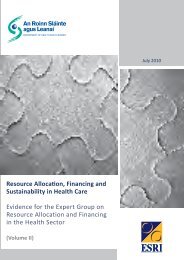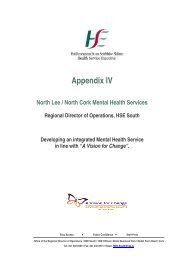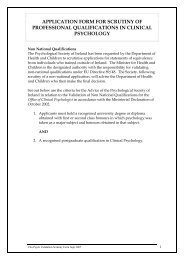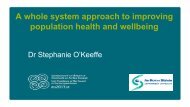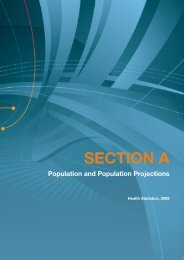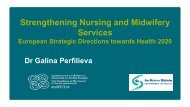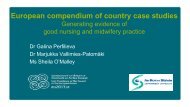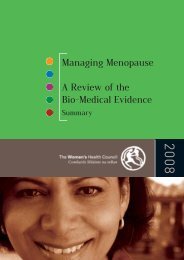Brennan Report - Department of Health and Children
Brennan Report - Department of Health and Children
Brennan Report - Department of Health and Children
Create successful ePaper yourself
Turn your PDF publications into a flip-book with our unique Google optimized e-Paper software.
<strong>Report</strong> <strong>of</strong> the Commission on Financial Management <strong>and</strong> Control Systems in the <strong>Health</strong> Servicecardholder consults the GP. In some cases the GP may have little or no contact with aregistered patient, while in other cases the GP may have frequent consultations with a medicalcardholder. Capitation fees per patient range from ¤ 36 per patient per annum to ¤ 670 perpatient per annum, as shown below:●●Annual capitation fee for pre-existing (largely means-tested) cardholders: from ¤ 36 to¤ 171 (range depends on patient’s age, sex <strong>and</strong> distance from doctor’s surgery).Annual capitation fee for newly-eligible (non-means tested) over 70s category: ¤ 462 or¤ 670 (the higher rate is payable in respect <strong>of</strong> persons resident in nursing homes).The st<strong>and</strong>ard GP capitation fee only covers GP services provided between 9am <strong>and</strong> 5pm,Monday to Friday. Although applying st<strong>and</strong>ard <strong>of</strong>fice hours to a service that requires (onoccasion) a 24 hour a day, 7 day a week service seems to be a mismatch between servicedelivery <strong>and</strong> service dem<strong>and</strong>s, under their contract, GPs are entitled to additional payments forservices provided outside this period, such as:● Surgery: ¤ 35.● Home visits: ¤ 35 to ¤ 70 (depending on the distance to patient’s home).GPs also get extra payments for certain additional services provided. These include:● Suturing <strong>of</strong> cuts <strong>and</strong> lacerations/ECG tests <strong>and</strong> their interpretation: ¤ 22.● Influenza vaccination: ¤ 30.● Hepatitis B vaccination: ¤ 108.The medical card scheme represents a major challenge <strong>and</strong> financial risk to the health servicenationally. There are three broad but clearly interrelated areas <strong>of</strong> concern:● As seen in Chapter 2, there have been serious failures in costing changes, monitoringoperations <strong>and</strong> verifying expenditures.● There is little or no evaluation <strong>of</strong> attendance patterns, prescribing rates, hospital referralsetc. amongst GPs within the medical card scheme.● The increase in the costs associated with the medical card scheme is very high –the cost in 2002 (over ¤ 900 million, including the supplementary estimate) is some two<strong>and</strong> a half times greater than the 1997 figure.In relation to the Medical Card Scheme, the choices faced by Government, on behalf <strong>of</strong> the taxpayingpublic, are stark. It can either:● accept that this system cannot be controlled <strong>and</strong> continue to meet the annual funding deficits <strong>of</strong>such an open ended scheme;or● it can negotiate budget limits for the scheme <strong>and</strong> devise mechanisms whereby agreed outputs, inline with the Government’s own <strong>Health</strong> Strategy, will be delivered for agreed budgets (e.g. in relationto reduction <strong>of</strong> inpatient admissions, treatment <strong>of</strong> more hospital Accident <strong>and</strong> Emergency casesthrough the primary medical service, etc).We believe it is in the public interest to increase the controls in this system.78



